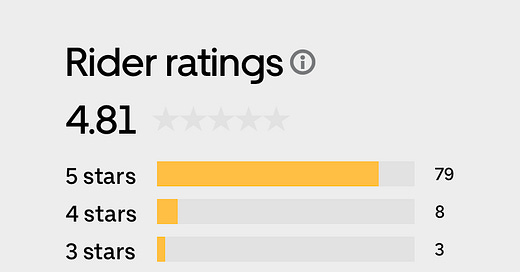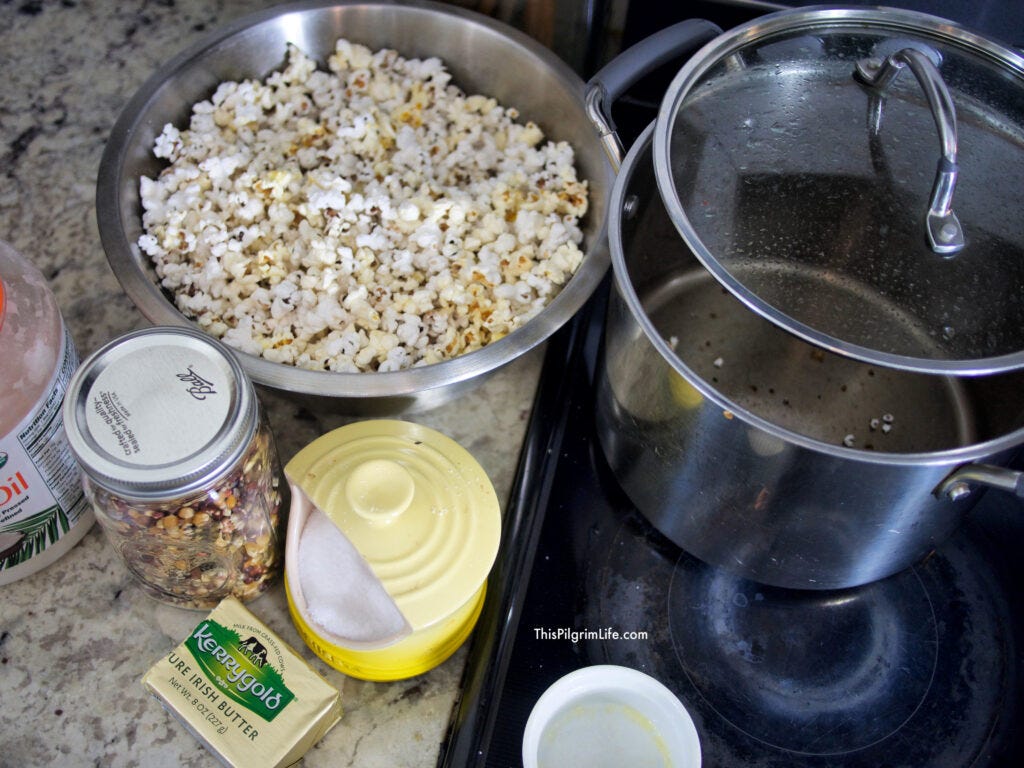The Crunchwrap Investigates Its Uber Rating
+ one driver's guide to morality and the underrated glory of stovetop popcorn
Happy Friday and welcome back to The Crunchwrap!
This week, we’re dissecting social norms (as usual?) and talking taxi dystopia, popcorn, and more. It’s April 15 — the day that Jackie Robinson broke the color line in baseball by debuting for the Brooklyn Dodgers and the day that Ray Kroc broke the cardio line by opening his first McDonald’s franchise in Des Plaines, Illinois.
First Crunch
Earlier this year, Uber announced a feature where riders can see a detailed breakdown of their ratings as a passenger.
In other words, you can now how many times drivers have determined you to be a menace unworthy of private transportation and slapped you with a 1-star rating. (If you didn’t already know that you have your own Uber rating or that you can see it, friend of The Crunch Jen Doll wrote a funny, all-around excellent piece about it here a few years ago.)
As I’ll get into with *great sanctimony* later, I try to avoid Uber whenever possible these days, but curiosity got the best of me. Here are my stats for Uber over the years, which I kind of want to put up on my fridge like an old spelling test:
What fascinates me about this new development is how subjective it is. For one driver, a rider who mumbles hello as they get in and zones out to their headphones may be a perfect five-star passenger. For another, that might be a stuck-up jerkass whose failure to extend pleasantries to a service worker is a social crime, an offense punishable by a two-star rating. For some, answering the phone might be immediate disqualification for upper-tier rankings; for another that might be no big deal.1
In reading about this new feature, what really stood out to me though was the moral code of one intrepid driver named Randy Clarke. Here’s his philosophy about rating passengers: “It’s either one or five, there’s no in-between with me.”
Wow, right? Completely rejecting the nuance of a five-star system and turning it into Pass/Fail, for me at least, feels like the most refreshing thing in a world where everything gets hopelessly parsed to death.2 The fact that I spend WAY too much time online influences this.
Not to put words in Clarke’s mouth, but I think boiling the intentions of people down to either “basically decent” or “basically not decent” is an appealing way to live right now. There’s still a lot of space to be a fallible, normal human within that framework. That said, here’s what will get you a digital smackdown from him:
For Clarke, it’s drinking alcohol in the car, yelling or screaming, not being at the set pickup point, slamming doors, asking overly personal questions, trying to fit extra passengers, adding stops mid-ride, touching him, touching his radio, and throwing up anywhere but the medical-grade plastic bags he has thoughtfully provided.
And while all this ALREADY seems reasonable, it’s also crucial to note that, even in this model, you can still barf in the car as long as you’re thoughtful enough to grab a bag first.
Most people wouldn’t be that forgiving.
Related reading: Another friend of The Crunch Olga Khazan offers up a well-researched breakdown of the possible reasons why so many people you encounter seem to be acting like maniacs.
Quick Plug
Speaking of Uber, last week for WIRED, I wrote about how, after a decade of fighting and decimating cabs, the company is now partnering up with taxi fleets in New York and San Francisco to put cabs on their platform.
Part of this has to do with the fact that apps like Uber are facing a labor shortage after alienating their worker base with diminishing pay, few protections, and generally bad corporate behavior. What I wrote about, though, is more about how this partnership with cabs stinks of what happens when we cherish disruption too much and cede the priorities of the public to business.
The deference and leeway afforded to business in the United States is the stuff of legend. Without trains, we’d be stuck traveling by boat or horse. Without cars and airplanes, we’d be stuck traveling by train. Left in the wake of all that innovation are the people and places that progress forgot. That’s a tragic yet broadly accepted part of the bargain.
But that’s not even what this generation of digital disruptors is doing. Many Silicon Valley companies, and the firms that prop them up, aren’t creating an exciting new future so much as further confusing an already confounding and dysfunctional present.
I’ve given you the gist of it, but y’know, check out the rest here for more context on the sloppy reach of disruption.
Video Break
I live within 15 minutes of Yankee Stadium so this is technically contraband BUT last weekend, Jeremy Peña, the 24-year-old rookie shortstop for the Houston Astros, got his first major league hit. When the TV broadcast sent a reporter to interview his parents during a later at-bat, something even better happened:
Snack of the Week: Stovetop Popcorn
Look, sometimes you can’t overthink these things. As someone who used to go to the movies explicitly for the popcorn, I had my soft, weak mind blown when my friend Becca introduced me to easy joy of stovetop popcorn back in 2010. Before then, I was a Microwave Guy™, always disappointed, my hands awash in rivulets of poorly distributed artificial butter. It felt like a metaphor for my life.
All you need is a pot with a lid, corn kernels, and some type of oil. (I go with olive oil for my long-term well being, but weirdos out there do coconut, canola, avocado, peanut, all kinds of nonsense.)
Here are the steps:
—Heat the oil in the pot for a minute somewhere between low and medium.
—Drop in a quarter cup of kernels (for one stoned person or two reasonable people) and cover the pot.3
— Shake the pot every 15 seconds or so, watch the kernels pop, and ponder the universe.
—Wait till the popping becomes infrequent, kill the heat, dump it into a bowl.
At this point, you can do a lot of things. I sometimes throw some beef tallow or butter into the empty pot (it melts super fast) and then cover the popcorn with it followed by salt, pepper, and garlic powder. Sometimes I get a little saucy and add smoked paprika or nutritional yeast. The point is, you’ll find what you like. And it’s the absolute best.
Nu, what else?
If “Pretty Woman” was a Cinderella story for the “American Pyscho” era of corporate raiding, its hero wearing his aggression on his sleeve, “Fifty Shades” is one for the “Dark Money” era. Loved this piece from Lydia Kiesling on rags-to-riches lit.
Jonathan Haidt has a long but very worthy story on how social media has made us dumber over the past decade. It’s one of those stories that seems obvious and then melts your brain.
I finally caught the season finale of Severance on Apple TV. The first season is excellent. Borrow somebody’s password and check it out!
That’s it for this Crunchwrap. Thanks as always for reading.
Happy Passover, Blessed Easter, Ramadan Kareem, and painless Tax Day to all of you who celebrate.
Love,
Adam
I’ll never know who gave me that two-star rating, but if I had to guess, it involved the aftermath of a holiday party and the housing of a Double Quarter Pounder with Cheese.
And yet, here I am, parsing.
I leave a little space at the top uncovered for airflow, which is controversial and dangerous if you aren’t minding where the kernels go. It’s my way and I won’t change.








